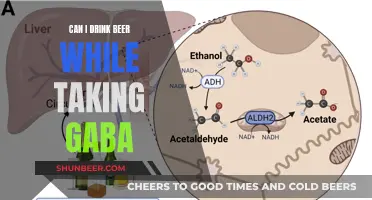
There is a long-standing suspicion that there is a connection between beer and powerlifting. Beer is often associated with adding pointless calories, but it is simply a source of calories for powerlifters. While getting drunk every night can hinder recovery, drinking in moderation and staying active can be beneficial. Powerlifters who consume alcohol recreationally or socially may not need to give up beer entirely, but rather focus on managing their intake to avoid negative effects on strength and recovery.
What You'll Learn

Powerlifters can drink beer in moderation
Dr. Layne Norton, a competitive powerlifter and PhD in Nutritional Sciences, notes that "a lot of people think they can't drink alcohol at all, and that's not true. There are plenty of high-level lifters who drink recreationally or socially." Norton suggests that the key is dosage, and that a few beers won't significantly impact strength levels. Swedish nutritional consultant and strength trainer Martin Berkhan agrees, stating that "no harm is done with a low dose" of alcohol.
However, it is important to note that alcohol can prolong the recovery process after a workout. The body needs to recover from training stress by repairing affected tissues, and alcohol consumption forces the body to delay this process to eliminate the alcohol from the system. This delay can be detrimental to high-intensity training regimens with little time between sessions.
Additionally, alcohol consumption can decrease testosterone levels, which are important for building strength and muscle. While a low dose of alcohol for three weeks causes only a negligible drop in testosterone, a higher dose can result in a more significant decrease.
For powerlifters who enjoy a drink, it is recommended to schedule drinking sessions away from training days and competitions. Staying hydrated and consuming sodium can also help mitigate the negative effects of alcohol on the body.
In conclusion, powerlifters can drink beer in moderation as part of a balanced lifestyle. However, it is important to be mindful of alcohol's impact on the body and to prioritize training and performance goals.
Trappist Monks and Beer: A Complex Relationship
You may want to see also

Beer is just calories for powerlifters
When you drink alcohol, your body must delay the recovery process from training to eliminate the alcohol from your system. This means that if you are training at high intensity, you will likely have no time to waste between training sessions by forcing your body to metabolize alcohol. If you are training at a lower intensity, you will likely be fully recovered before your next workout, so drinking alcohol will not have such a detrimental effect.
Drinking alcohol can also affect testosterone levels, which can impact muscle growth. A low dose of alcohol for three weeks causes a negligible drop in testosterone, but a high dose can cause a twenty to forty per cent drop in testosterone the following day.
If you are a powerlifter, it is important to know how your body reacts to alcohol. If you are accustomed to drinking, you will have more enzymes to help break it down. If you rarely drink, consuming four or five beers will likely impair you.
It is also important to note that alcohol can affect your ability to eat quality food or exercise the next day, which can cause problems with your strength and recovery. So, while beer is just calories, it is the effect of these calories on your body and training that is important to consider.
Beer and Colds: Should You Drink or Skip It?
You may want to see also

Alcohol affects everyone differently
Size and weight play a significant role in how alcohol affects an individual. The amount of water in the body, which is generally higher in larger people, dilutes the alcohol in the bloodstream. As a result, smaller people tend to have a higher ratio of alcohol in their blood when consuming the same amount as someone heavier. For instance, men, who generally have more body water than women of similar weight, can tolerate higher amounts of alcohol before showing its effects.
Health is another factor that determines how alcohol affects a person. Age, for example, influences alcohol tolerance. As people age, their body composition changes, resulting in a higher fat-to-muscle ratio and lower body water content. Consequently, older individuals may experience a higher concentration of alcohol in the blood compared to younger people of the same weight. Additionally, older adults often take medications that can interact with alcohol, further complicating its effects.
Drinking habits also impact how alcohol affects an individual. People who are accustomed to drinking have more enzymes that aid in breaking down alcohol. Therefore, a person who rarely drinks may experience greater impairment after consuming the same amount as a regular drinker.
The consumption of other drugs alongside alcohol can also alter its effects. Mixing alcohol with drugs like cannabis, cocaine, or benzodiazepines can lead to unpredictable outcomes and increase the risk of harm.
It's important to note that alcohol is a depressant drug, slowing down the messages travelling between the brain and body. While it may provide a temporary reprieve from self-control, excessive consumption can lead to negative consequences, including liver and brain damage. Therefore, it's crucial to drink responsibly and follow recommended guidelines to minimise potential harm.
The Magic of Beer Widgets: How Do They Work?
You may want to see also

Alcohol can hinder recovery
Alcohol can indeed hinder recovery, and this is true for powerlifters and non-athletes alike. Alcohol is a poison, and while it may not be logical to assume that it should therefore be completely avoided, it can certainly cause problems for the body and its ability to recover.
Alcohol affects everyone differently, and while some powerlifters may be able to drink recreationally or socially without it impacting their performance, others will be more susceptible to its effects. A person who is accustomed to drinking will have more enzymes to help break the alcohol down, and so will be less impaired by a few beers. However, drinking to the point of a hangover will affect strength and recovery for anyone.
Research has shown that drinking to excess can cause a notable drop in testosterone levels, which will, in turn, hinder muscle growth and protein synthesis. Alcohol also decreases the body's ability to absorb vitamins and minerals, leading to malnutrition. This will also affect recovery, as the body will be lacking the nutrients it needs to rebuild.
Alcohol also has a negative impact on bone health, increasing the risk of weak and thinning bones (osteoporosis). This will affect recovery from any injury that involves the bones, and will also hinder performance in the gym. Alcohol also dehydrates the body, causing an increase in muscle cramps, which will again hinder training and recovery.
In addition, alcohol delays the healing process for skin damage and wounds. It disrupts the inflammatory response, causing alterations in cytokine and chemokine production, which will affect the body's ability to recover from any injury that breaks the skin.
Finally, alcohol negatively affects muscle function and coordination, which will hinder performance in the gym and could also increase the risk of injury.
Beer and Tramadol: A Risky Mix?
You may want to see also

Alcohol decreases testosterone output
Testosterone is the primary male sex hormone, giving men their masculine features and playing a critical role in muscle and bone growth, as well as sperm development. When testosterone levels drop, it can lead to problems such as erectile dysfunction and low sex drive.
Drinking alcohol excessively can cause short-term and long-term changes to testosterone levels. Research has found that testosterone can drop in as little as 30 minutes after alcohol consumption. In one study, healthy men were given a pint of whiskey per day for 30 days, and their testosterone levels were compared to those of chronic alcoholics. The healthy men's testosterone levels began dropping by the third day and reached similar levels to those of the alcoholics by the end of the month.
Acute alcohol consumption can cause short-term impairments in testosterone release by negatively affecting the hypothalamus and pituitary gland. The hypothalamus releases gonadotropin-releasing hormone (GnRH), which acts on the pituitary gland. The pituitary gland then releases luteinizing hormone (LH) and follicle-stimulating hormone (FSH). In response to LH and FSH, the testes synthesize testosterone. Alcohol can disrupt this process by interfering with all three glands.
Chronic alcohol misuse is thought to damage the Leydig cells in the testes, which are responsible for testosterone production. Alcohol may also interfere with the release of LH, FSH, and GnRH. Heavy drinkers are more likely to experience erectile dysfunction and low testosterone levels.
Moderate alcohol consumption, usually defined as no more than one drink for women or two drinks for men in a single day, does not seem to have long-term effects on reproductive health or testosterone levels. However, larger or more frequent amounts of alcohol consumption can lead to a decrease in testosterone production.
According to a 2023 review, alcohol consumption can reduce testosterone production, especially when an individual drinks heavily and chronically. Additionally, evidence suggests that genetics can play a role in this process. A 2022 study found that heavy-drinking Korean men who experience a flush when drinking had lower testosterone levels than non-drinkers. The study suggested that there may be a genetic link between flushing and low testosterone levels in this population.
While the effects of alcohol on testosterone levels can vary depending on individual differences in alcohol metabolism, heavy drinking is generally considered to be more than 15 drinks per week for men. Quitting alcohol or reducing alcohol intake to a safe level may help reverse some of the damage caused by chronic drinking.
Beer Ads: Drinking on the Job?
You may want to see also
Frequently asked questions
No, that's not true. Powerlifters can drink beer, but it's important to remember that alcohol is a poison and can affect people differently. While some powerlifters may choose to avoid it completely, others may drink recreationally or socially without any negative impact on their performance.
Alcohol can impair physical and mental performance, especially at medium to high doses. It can also affect recovery, reaction time, and skill execution. However, low doses of alcohol are less likely to cause significant harm.
Alcohol can decrease testosterone levels and may impair muscle protein synthesis. However, the effects are temporary and more pronounced with higher doses of alcohol. Chronic alcohol abuse is a bigger concern than occasional binge drinking when it comes to muscle growth.
Yes, drinking in moderation, staying hydrated, and ensuring proper nutrition can help minimize the negative effects of alcohol. Scheduling drinking sessions on non-training days can also help.
Powerlifters who want to maximize their performance should stick to low doses of alcohol. If competing in a meet, it is advisable to avoid high doses of alcohol until after the competition.







